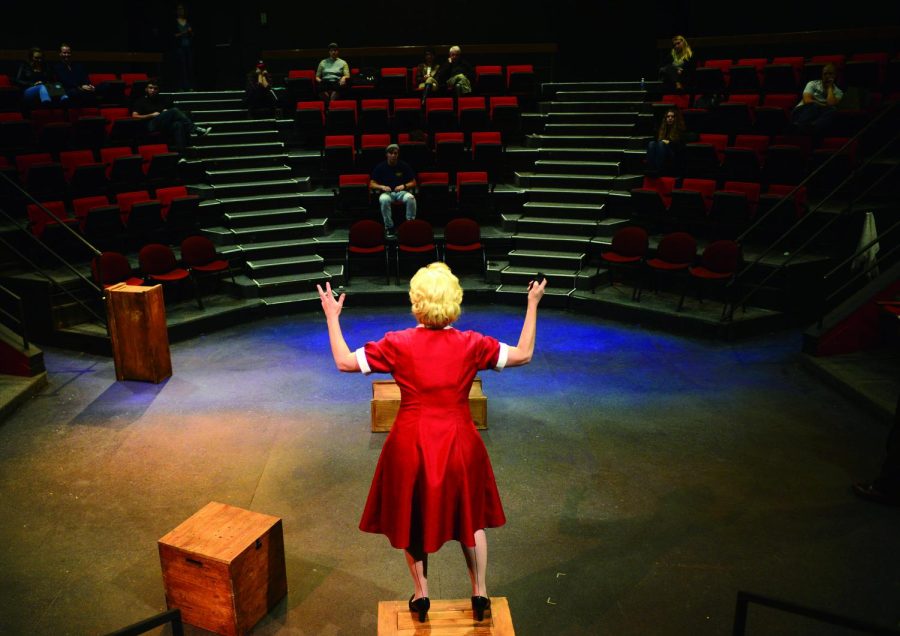Theater groups address diversity on campus through art
Jess Tanner, a graduate theatre studies major, as Irena Gut Opdyke in a rehersal for Kent State’s production of “Irena’s Vow” in Wright-Curtis Theatre on Thursday, Oct. 13, 2016.
Hollywood isn’t the only level of the entertainment industry working to broaden its inclusion. Locally, theatre organizations on campus commit to telling stories of varying backgrounds and offering equal opportunities for success.
“We support compassion, equality and dignity for all artists,” Eric van Baars, interim director of the School of Theatre and Dance, said.
It’s through the school’s curriculum and productions that van Baars said the faculty and students incorporate as many perspectives and cultures as possible.
“We want to keep it in balance so that the students and faculty that are here are a representation of the people that are actually in the community,” van Baars said. “We adhere to that, but there’s no (diversity initiative) other than within our production season of looking at what plays we work on, that there’s an awareness of finding a diversity of voices.”
Upon first glance, last semester’s production of “Irena’s Vow” can stick out as a diversity faux pas. The play, set in Poland during the Holocaust, featured an all-white cast, but van Baars defended its place in diversification.
“You could look at it as, yes, it was an all-white cast, but it was a story of different cultures coming together,” he said. “I try to get out of the binary of black and white when we talk about diversity because it becomes a very two-sided operation.”
Outside of race, van Baars believes diversity can encompass an umbrella of classifications, including socioeconomic status, gender and culture.
Last semester, a new theater troupe formed on campus to provide additional cultural immersion to willing audiences. The Pan-African Theatre Ensemble (P.A.T.E.) focuses on the black experience, approaching it through a lense of unity and empowerment.
“The P.A.T.E. was not formed solely to fill a gap, but has become a place for underrepresented groups to participate in theater at all levels on campus,” said Amy-Rose Forbes-Erickson, assistant professor of Pan-African theatre and P.A.T.E. artistic director.
Forbes-Erickson will direct the group’s newest production “Venus,” which deals with topics of slavery and human trafficking. The cast and crew will present an excerpt of the show in Ghana as part of the Pan-African Historical Theatre Festival.
“We provide an alternative outlet for creative people looking for opportunities,” Forbes-Erickson said. “We will continue to provide a space and voice to all people concerned about social justice in theatre.”
As for the Oscars and its step back to the direction of inclusion, van Baars is glad progress is being made.
“It’s good to see the diversity recognized, not for the sake of diversity but for the recognition of exceptional talent,” he said.
The reason diversity is so important to artists and audiences, as van Baars puts it, is “simply because it’s who we are,” and it is a powerful way to spark change and acceptance.
“People need to get to know each other better, go outside of what’s familiar,” he said. “It starts with the individual.”
Benjamin VanHoose is the features editor for the Kent Stater, contact him at [email protected].


